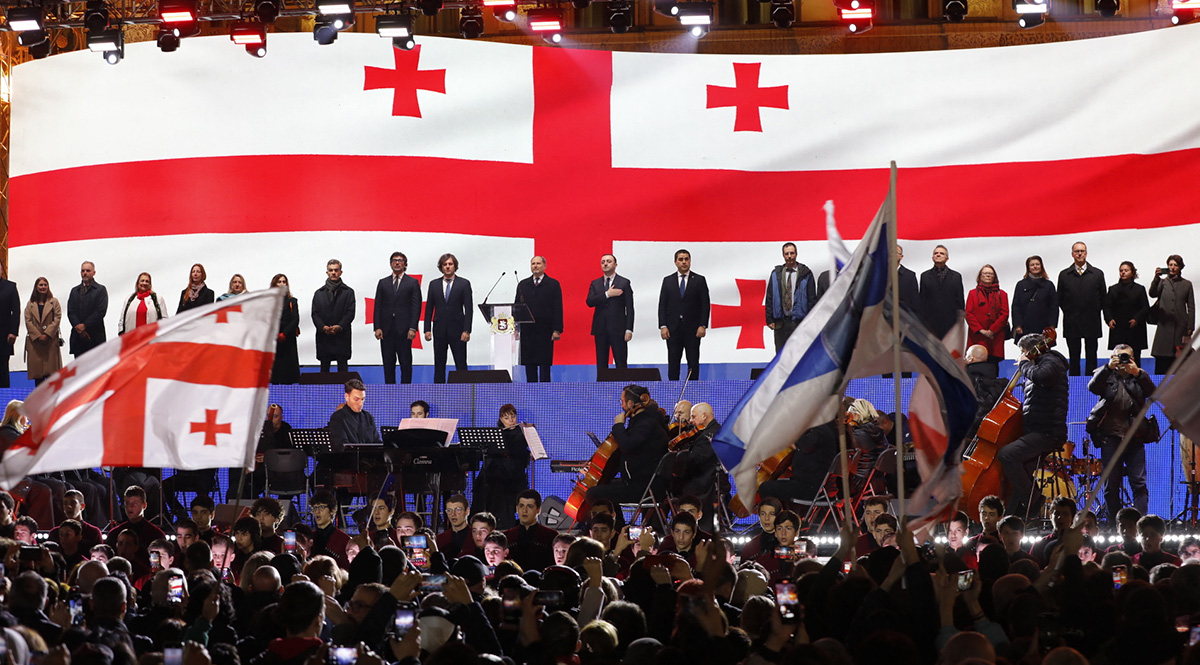Georgia in Crisis Over "Foreign Agents" Law
The ruling camp in Georgia has again proposed the adoption of a law on so-called foreign agents. In response, mass protests rose up again, a year after the ruling party Georgian Dream withdrew from pushing the bill after two days of demonstrations. The ruling party stresses that the adoption of the law will increase transparency in media and NGO funding. The opposition accuses it of attacking freedom of expression ahead of the parliamentary elections and of copying legislative solutions from Russia. The EU and the U.S. have unanimously condemned the actions of the Georgian government, stating that the adoption of the legislation will mean a halt to Georgia’s EU integration process.
 AA/ABACA / Abaca Press / Forum
AA/ABACA / Abaca Press / Forum
What is in the draft law?
The Law on Transparency of Foreign Influence, as the new draft legislation is officially called, stipulates that entities such as media outlets and non-governmental organisations (NGOs) must be registered with state authorities if at least 20% of their funding coming from foreign sources. Georgian Dream (GD) stresses that the legislative solution is aimed at increasing the transparency of funding of these entities. However, the stakeholders themselves, as well as the opposition, stress that the law is modelled on an analogous law adopted in Russia more than a decade ago by Vladimir Putin’s regime (similar regulations were adopted in Viktor Orbán’s Hungary and Benjamin Netanyahu’s Israel). The real aim is to weaken, and ultimately destroy, independent media and the third sector before the October parliamentary elections. Independent media and NGOs are often critical of the government, pointing out, among other things, its corruption and failure to implement reforms recommended by the EU.
A third reading of the bill is scheduled for 17 May and GD is determined to pass it. President Salome Zurabishvili has announced that she will veto it, but GD has the necessary majority to override the veto.
How are the protests against the bill going?
The demonstrations have been ongoing for more than a month now. They peaked at just over 100,000 participants and have taken place mainly in Tbilisi where the core is of composed of representatives of the younger generation who are unequivocally pro-European, often studying in the West or having worked there in the past. The demonstrators are demanding that the GD withdraw the draft law, implement reforms put forward by the EU, as well as respond to the concerted action by the opposition in the face of the ruling party’s authoritarian and anti-Western twist. Another mass rally is planned for 11 May, with the culminating protest on 17 May. The protests have been forcibly broken up by security forces. The head of the main opposition party United National Movement (UNM), Levan Khabeishvili, was brutally beaten.
In the event of intransigence on the part of the GD and an increase in the brutality of the law enforcement forces against demonstrators, both before and after the adoption of the law, the situation could evolve into a street revolution to overthrow the current authorities.
How is the opposition involved in the protests?
The protests are spontaneous and grassroots in nature. Their participants do not trust either the GD or the opposition (in particular Mikheil Saakashvili’s former ruling party UNM). Georgian opposition leaders, who oppose the project and call it a Russian law aimed at subjugating Georgia to the Kremlin, appear at the demonstrations but mostly do not speak from the stage or lead them. The Georgian opposition is weak, divided, and conflicted. Imprisoned former President Saakashvili has appealed to its leaders to unite ahead of autumn’s parliamentary elections and to issue a single list to defeat the GD.
What has been the reaction of the EU, the U.S., and Russia to the proposed law?
Both the EU and the U.S. have unanimously condemned the bill. They stress that the law contradicts EU recommendations to Georgia after it was granted candidate status for membership last year (including strengthening media freedom, involvement of civil society in the reform process, and others), and its adoption will mean that Georgia’s EU integration process will come to a halt (accession negotiations will not be launched at the end of this year). The European Parliament adopted a resolution condemning the Georgian authorities and demanding personal sanctions against GD leaders, including Bidzina Ivanishvili.
Russia de facto supported the adoption of the law, declaring that every sovereign state has the right not to want interference by other countries in its internal politics. According to the Russian authorities, the bill was used by the Georgian opposition to stir up anti-Russian sentiment in Georgian society.
What will be the consequences if the law is adopted?
The proposal will most likely become law, which will have consequences in the autumn parliamentary elections. On the one hand, for the opposition, the current situation theoretically strengthens its chances of electoral victory. On the other hand, GD may decide to tighten its political course, limit the opposition’s options, and attempt to rig the results of the parliamentary elections. Georgians, who mostly (around 80-90%) support their country’s future membership of the EU, may turn their backs on the GD. However, for this to happen, the opposition needs to unite, with the new faces linked to the current protests in its ranks.
The adoption of the law will mean a definitive change in Georgia’s foreign policy course from a pro-Western to a pro-Russian and pro-Chinese one. It will result in a halt to Georgia’s EU integration process and a serious crisis in relations with the U.S. This could, in the long term, translate into the withholding of financial support to Georgia from the U.S. and the EU, the suspension or withdrawal of Georgia’s candidate status for EU membership, the suspension of visa-free travel for Georgians to the EU, and the imposition of personal sanctions on GD leaders.
The Polish Ministry of Foreign Affairs reacted to the protests in Georgia and stressed that it was observing the situation in Tbilisi with concern and that the use of force against protesters was unacceptable.



.jpg)

